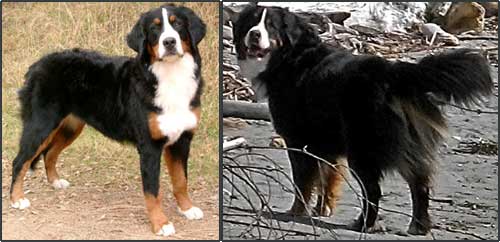Bernese Mountain Dogs are adorable, fluffy companions known for their gentle nature and loyalty. But like any young pup, they go through a teething phase that can be quite intense. So, when do Bernese Mountain Dogs stop teething? Let’s find out!
As a 13-year-old, you may be wondering why teething is such a big deal for these lovable canines. Well, just like human babies, Bernese Mountain Dogs experience discomfort and itchiness as their adult teeth start pushing out their puppy teeth. It’s a natural process, but it can be a bit overwhelming for both the pupper and their pet parents.
The good news is that teething doesn’t last forever! Bernese Mountain Dogs typically start teething around 3 to 4 months of age and finish around 7 to 8 months. So, if you’re the proud owner of a Berner pup, don’t worry, the teething phase will pass, and soon you’ll have a full set of strong, pearly whites to marvel at!

When Do Bernese Mountain Dogs Stop Teething?
Teething is a natural phase in a Bernese Mountain Dog’s life as they grow from puppies into adult dogs. This process involves the eruption of their permanent teeth and the shedding of their baby teeth. Understanding when this teething phase typically occurs and how long it lasts can help dog owners provide appropriate care and support during this time. In this article, we will explore the timeline of when Bernese Mountain Dogs typically stop teething and provide tips for managing this process.
1. The Teething Process in Bernese Mountain Dogs
The teething process in Bernese Mountain Dogs usually starts around the age of 3 to 4 months. At this stage, their baby teeth begin to loosen and fall out, making way for the eruption of their permanent teeth. The incisors are usually the first to fall out, followed by the canine teeth and premolars. By approximately 8 months of age, most Bernese Mountain Dogs have completed their teething process, and all their permanent teeth should have come in.
During the teething phase, Bernese Mountain Dogs may experience discomfort and pain in their gums. As a result, they may chew on objects to alleviate the discomfort. It’s essential to provide appropriate chew toys and dental treats during this period to redirect their chewing behavior and prevent damage to furniture or personal belongings.
2. Signs to Look Out For
As a Bernese Mountain Dog owner, it’s important to be aware of the signs that indicate your dog is teething. Some common signs to look out for include increased chewing behavior, swollen or inflamed gums, drooling, and reluctance to eat hard food. Your dog may also exhibit a slight decrease in appetite during this period, as chewing on hard objects can be uncomfortable. If you notice any excessive bleeding, severe pain, or signs of infection, it’s crucial to consult your veterinarian.
During the teething process, it’s important to maintain regular dental care for your Bernese Mountain Dog. Brushing their teeth regularly and providing dental cleaning treats can help promote good oral health and prevent any issues associated with teething, such as gum disease or tooth decay.
3. Tips for Managing the Teething Process
To help your Bernese Mountain Dog during the teething process, it’s important to implement certain strategies to alleviate their discomfort and encourage appropriate chewing habits. Here are some tips for managing the teething process:
1. Provide appropriate chew toys: Invest in high-quality chew toys made specifically for teething puppies. These toys are designed to provide relief to their sore gums and encourage healthy chewing behavior.
2. Freeze toys and treats: Consider freezing some of your dog’s chew toys and treats. The cold temperature can help soothe their gums and provide temporary relief from teething discomfort.
3. Regularly check their mouth: Monitor your dog’s mouth regularly for any signs of infection, bleeding, or retained baby teeth. If you notice any issues, consult your veterinarian for further guidance.
4. Use dental products: Introduce brushing your Bernese Mountain Dog’s teeth at an early age to get them accustomed to the routine. Additionally, dental wipes, water additives, and dental chews can help maintain good oral hygiene.
5. Seek professional help if needed: If you’re having difficulty managing your Bernese Mountain Dog’s teething or if you have any concerns, don’t hesitate to seek guidance from a professional dog trainer or a veterinarian. They can provide expert advice tailored to your specific situation.
Remember that each Bernese Mountain Dog may have slightly different teething timelines and experiences. It’s important to observe your dog’s individual needs and provide appropriate care and attention during this crucial phase of their development.
Additional Information on Teething in Bernese Mountain Dogs
4. Teething vs. Behavioral Chewing
It’s crucial to differentiate between teething-related chewing and behavioral chewing in Bernese Mountain Dogs. While teething chewing is a natural response to the discomfort caused by the eruption of new teeth, behavioral chewing may indicate a need for mental and physical stimulation. If your Bernese Mountain Dog continues to chew excessively even after the teething phase, it’s important to provide them with appropriate outlets for their energy, such as regular exercise, interactive toys, and mental stimulation activities.
5. Dental Health Benefits of Teething
While the teething process may be challenging for both Bernese Mountain Dog puppies and their owners, it is also an opportunity to establish good dental health habits. Introducing dental care routines during this period can set the foundation for a lifetime of healthy teeth and gums. Regular brushing, dental vet visits, and providing appropriate chew toys can help prevent dental issues such as plaque build-up, gum disease, and tooth decay.
6. When to Consult a Veterinarian
While teething is a natural part of a Bernese Mountain Dog’s development, certain situations may require the attention of a veterinarian. If your dog experiences prolonged or excessive bleeding, extreme pain, loss of appetite for an extended period, or if their teething process deviates significantly from the usual timeline, it is advisable to seek veterinary care. A veterinarian can examine your dog’s teeth and gums, address any concerns, and provide appropriate guidance for their specific needs.
By understanding the teething process, being attentive to your Bernese Mountain Dog’s needs, and implementing appropriate strategies, you can help make their teething phase more comfortable and ensure their dental health for years to come.
Key Takeaways: When Do Bernese Mountain Dogs Stop Teething
- Bernese Mountain Dogs usually stop teething around 6 to 8 months of age.
- During this teething phase, they may experience discomfort and tend to chew on things to relieve it.
- Providing appropriate chew toys can help redirect their chewing behavior.
- Regular teeth brushing and dental care are important for their overall oral health.
- Consulting with a vet can provide guidance on managing your Bernese Mountain Dog’s teething process.
Frequently Asked Questions
Teething is a natural process that all Bernese Mountain Dogs go through. It’s important to know when they will stop teething so that you can provide them with appropriate care and training. Below are some common questions and answers related to when Bernese Mountain Dogs stop teething.
1. How long does teething last for Bernese Mountain Dogs?
The teething process in Bernese Mountain Dogs usually begins around three to four months of age and can last up to six months. During this time, you may notice your puppy chewing on various items to relieve discomfort and aid in the eruption of their adult teeth. It’s important to provide them with appropriate chew toys to redirect their chewing behavior.
As your Bernese Mountain Dog’s adult teeth start to come in, you may notice that their puppy teeth start to fall out. This is normal and a sign that their permanent teeth are coming in. Once all the adult teeth have fully erupted, your Bernese Mountain Dog should have stopped teething.
2. How can I help my Bernese Mountain Dog through the teething process?
There are several ways you can help your Bernese Mountain Dog during the teething process. Providing them with appropriate chew toys can help relieve their discomfort and redirect their chewing behavior away from household items. Look for toys that are specifically designed for teething puppies, such as rubber toys or dental chews.
Additionally, you can soothe your Bernese Mountain Dog’s gums by giving them ice cubes to chew on or freezing toys to provide some relief. Make sure to supervise them during these activities to ensure they don’t accidentally swallow anything or hurt themselves.
3. When should I be concerned about my Bernese Mountain Dog’s teething?
While teething is a normal process, there are some instances where you should seek veterinary advice. If your Bernese Mountain Dog is experiencing excessive pain, excessive bleeding, or has not started teething by four months of age, it’s best to consult with a veterinarian. They can assess your dog’s dental health and provide appropriate guidance.
Additionally, if you notice any abnormal growth patterns or overcrowding of teeth in your Bernese Mountain Dog’s mouth, it’s important to bring it to the attention of your veterinarian. They can determine if any intervention or oral health care is required.
4. What can I do to protect my belongings during the teething stage?
During the teething stage, it’s important to protect your belongings from your Bernese Mountain Dog’s chewing tendencies. Start by providing them with appropriate chew toys and praise and reward them when they choose to chew on those toys instead of household items. Avoid leaving valuable or dangerous items within reach and consider using baby gates or crate training to limit your dog’s access to certain areas of your home.
If you catch your Bernese Mountain Dog chewing on something they shouldn’t, calmly redirect their attention to an appropriate toy and remove the item they were chewing on. Consistency in redirecting their behavior and providing them with alternatives will help them learn what is acceptable to chew on.
5. Are there any special considerations for teething in Bernese Mountain Dogs?
While the teething process in Bernese Mountain Dogs is similar to other breeds, it’s important to note their size and potential sensitivity. Bernese Mountain Dogs are large dogs with strong jaws, so providing them with durable and size-appropriate chew toys is crucial. Avoid toys that are too small and may pose a choking hazard.
Additionally, keep up with regular dental care for your Bernese Mountain Dog, even after they have finished teething. Brushing their teeth regularly and scheduling professional dental cleanings can help maintain their overall oral health.

Summary
Bernese Mountain Dogs stop teething around 6 to 8 months of age. During this time, they may experience discomfort and chew on objects to relieve it. It’s important to provide appropriate chew toys and discourage destructive chewing.
Additionally, regular dental care, such as brushing their teeth, can help maintain their oral health. Remember, teething is a normal part of a Bernese Mountain Dog’s development, and with proper guidance and care, they will grow out of it.
